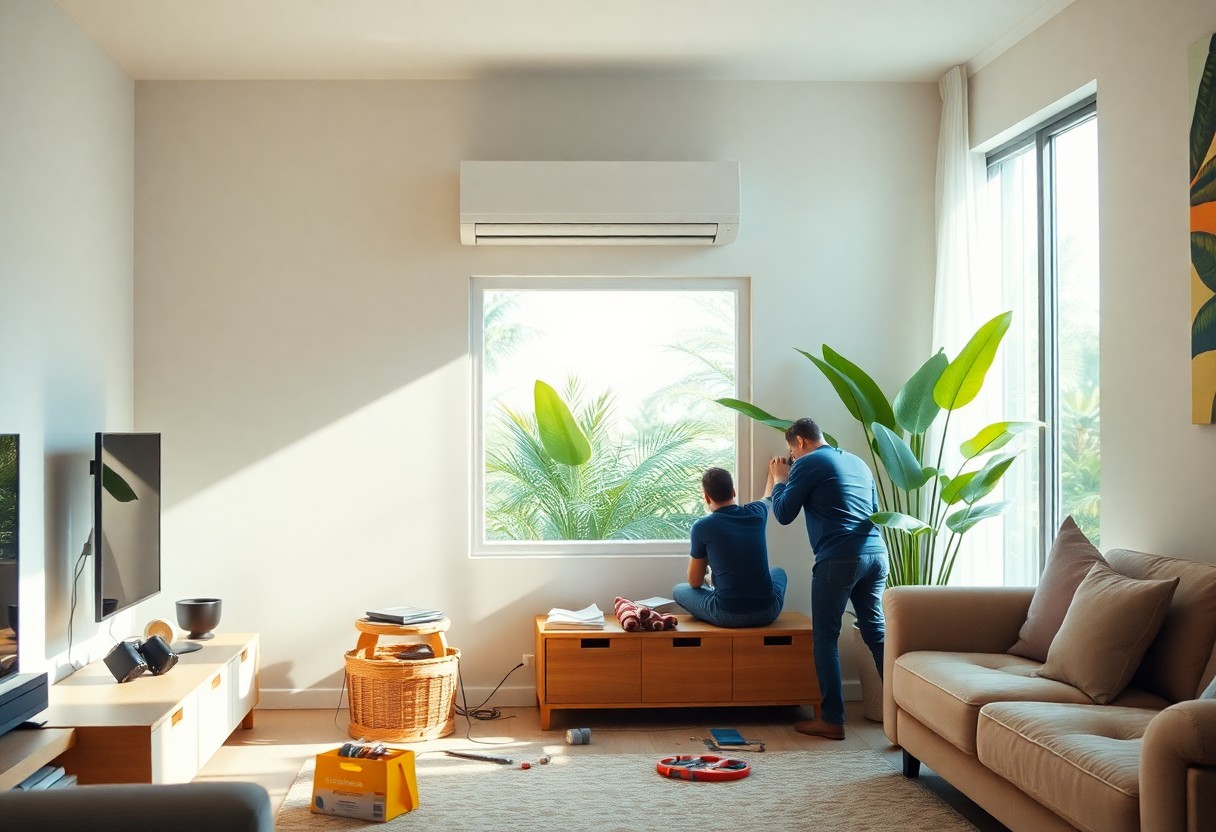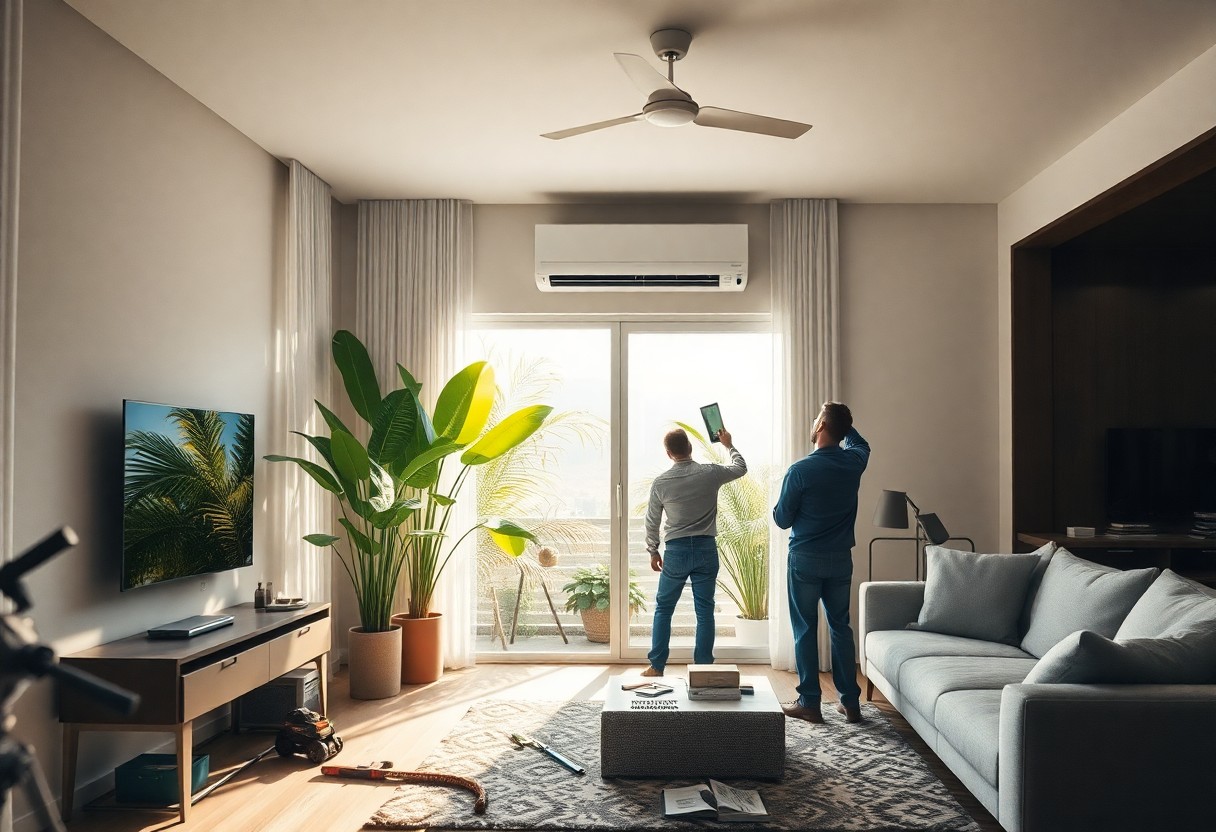Beat the Heat in Paddington – Top Air Conditioning Installation Tips You Need Now
Many homeowners in Paddington are searching for effective ways to stay cool during the sweltering summer months. Installing a reliable air conditioning system can significantly enhance your comfort, but there are necessary tips you should consider before committing to a purchase. From selecting the right unit for your space to ensuring proper installation, this guide will provide you with the vital information you need to make informed decisions about air conditioning installation in your home. Let’s examine the best practices that will help you beat the heat this season!
Key Takeaways:
- Assess your space to determine the right size and type of air conditioning unit for optimal cooling efficiency.
- Consider energy efficiency ratings when selecting an air conditioning system to reduce energy bills and environmental impact.
- Plan for professional installation to ensure proper setup, which can extend the lifespan of your unit and prevent costly repairs.
- Schedule regular maintenance checks to keep your system running smoothly and enhance indoor air quality.
- Explore options for smart technology integration, allowing for better control and energy management of your cooling system.
The Climate Challenge: Why Paddington Needs Reliable Cooling
Paddington’s unique climate, characterized by hot summers and mild winters, makes reliable cooling systems a necessity. As temperatures rise, indoor comfort becomes vital for both homes and businesses. Investing in an efficient air conditioning system ensures that you and your loved ones can escape the sweltering heat while maintaining a pleasant indoor atmosphere.
Understanding Local Weather Patterns
Paddington experiences a humid subtropical climate, with summer temperatures often exceeding 30°C. The region’s weather patterns include rainy spells, which can exacerbate the feeling of humidity. Knowing these patterns helps you choose the right air conditioning system that can effectively manage extreme heat while also addressing moisture levels, ensuring you stay comfortable year-round.
The Importance of Energy Efficiency
Energy-efficient air conditioning systems are not only environmentally friendly but also lead to significant savings on your energy bills. Selecting an Energy Star-rated unit can reduce energy consumption by up to 30%. Higher energy efficiency often translates to better performance, providing consistent cooling without overworking the system.
You can easily verify energy efficiency ratings by checking your air conditioner’s SEER (Seasonal Energy Efficiency Ratio) rating. Systems with a SEER rating of 14 or higher typically offer better efficiency, leading to lower operational costs. By investing in a high-efficiency model, you’ll create a comfortable living environment while minimizing your carbon footprint and saving money in the long run. The initial cost may be higher, but the long-term benefits in savings and comfort are worth the investment.
Choosing the Right System: Central vs. Ductless
Deciding between a central or ductless air conditioning system hinges on your specific needs and property layout. Central systems provide uniform cooling throughout larger homes and are often more efficient for extensive space. Conversely, ductless systems afford flexibility, allowing you to cool targeted areas without the need for ductwork. If you’re exploring options, are you prepared to beat the heat this summer? – HVAC Tips may provide some valuable insights.
Pros and Cons of Each Type
Pros and Cons of Central vs. Ductless Systems
| Central Systems | Ductless Systems |
|---|---|
| Pros: Uniform cooling | Pros: Energy-efficient; targeted cooling |
| Pros: Suitable for large homes | Pros: Easy installation; no ducts required |
| Cons: Higher installation costs | Cons: Limited cooling capacity for large spaces |
| Cons: Requires duct maintenance | Cons: Less effective for humidity control |
| Cons: Not ideal for retrofitting | Cons: Individual units can be visually intrusive |
Assessing Your Space and Needs
Your specific space requirements play a vital role in selecting between central and ductless systems. Begin by evaluating the size, layout, and insulation of your home. Larger, multi-story homes may benefit from central air for balanced temperature control, while smaller or uniquely structured spaces might find ductless solutions more suitable. Take note of existing ductwork, if any, as it influences your decision and installation cost. Assess room usage as well; areas like bedrooms can benefit from targeted cooling provided by ductless units, enhancing your overall comfort while managing your energy bills effectively. Conducting a thorough assessment not only helps in making an informed choice but also ensures you maximize the efficiency of your selected system.

Installation Must-Knows: Timing and Preparation
Timing and preparation significantly impact the efficiency of your air conditioning installation. Selecting the right time not only ensures optimal installation conditions but also maximizes the system’s long-term performance. An organized approach allows you to address any potential issues before the installation team arrives, setting the stage for a smooth process.
Best Time to Install Your Air Conditioning
Scheduling your air conditioning installation in the shoulder seasons—spring and fall—can yield the best results. During these times, temperature fluctuations are minimal, and demand for technicians is lower, allowing for more flexibility in your schedule. Avoiding the peak summer heat ensures a less rushed installation, which is beneficial for the longevity of your unit.
Preparing Your Home for Installation Day
Preparing your home for installation day involves more than clearing a space for the unit. You’ll want to remove any obstacles around the installation area, such as furniture or decorations, to provide ample room for the installers. Ensuring access to power sources and minimizing disruptions can enhance the efficiency of the installation process.
Take time the day before installation to clean the space where the air conditioning unit will be placed. If your unit is going in a closet or an area with limited space, consider moving items out to create a clear path for the technicians. Additionally, securing pets in a separate room can prevent distractions and help keep the installers focused on their work. You might also want to confirm with your installation team regarding any specific requirements or expectations they may have for the day, ensuring seamless coordination and communication.

Expert Insights: Hiring the Right Professionals
Selecting the right professionals for your air conditioning installation can greatly affect the system’s performance and longevity. Look for experienced technicians with a solid track record in the industry. Ask for references and assess their familiarity with your chosen system type. It’s also beneficial to examine how well they communicate about your specific needs and any concerns you may have, ensuring a smooth installation process.
Key Questions to Ask Potential Installers
Your discussions with potential installers should cover several imperative topics to gauge their expertise. Inquire about their experience with your particular air conditioning model and the average time required for installation. Additionally, ask how they handle permitting and inspections, and whether they provide warranties or post-installation support.
Evaluating Certifications and Reviews
Certifications and customer reviews are pivotal in assessing the reliability of installers. Look specifically for reputable certifications such as NATE or HVAC Excellence, which indicate that the technician has undergone rigorous training. Online reviews from sites like Google or Yelp can offer insights into customer satisfaction, while any notable industry awards reinforce the installer’s credibility.
When diving deeper into certifications and reviews, focus on recent feedback that highlights the technician’s responsiveness, problem-solving abilities, and adherence to schedules. A professional with a history of positive feedback and recognized certifications is more likely to provide quality service. Don’t shy away from requesting proof of their licenses and insurance, as this protects you from potential liabilities during installation. Engaging with local community forums can also reveal firsthand experiences from neighbors, providing valuable context beyond basic reviews.
Beyond Installation: Maintenance Tips for Longevity
Maintaining your air conditioning system ensures its longevity and optimal performance. Regular upkeep not only extends the life of your unit but also helps maintain energy efficiency, thereby reducing your overall energy bills. Key maintenance tips include:
- Clean or replace filters every one to three months.
- Check and clear drain lines to prevent clogs.
- Inspect insulation around ductwork.
- Schedule annual professional maintenance for system checks.
Any small effort you put into maintenance can save you time and money in the long run, ensuring you’re comfortable during the hottest days.
Seasonal Checklists for Optimal Performance
Seasonal maintenance checklists keep your air conditioner running efficiently. In spring, focus on cleaning the external unit of debris and ensuring your filters are clean. In summer, monitor for unusual noises or smells and check for proper airflow. Before fall, schedule a professional inspection to prepare for the cooler months. These steps ensure that your system operates efficiently, reducing the risks of unexpected breakdowns during peak heat.
Common Maintenance Myths Debunked
Many misconceptions surround air conditioning maintenance, which can lead to oversight. Believing that a larger unit is always better or that a “set it and forget it” approach suffices can negatively impact performance. Additionally, neglecting regular filter changes under the assumption that they’re fine if not visibly dirty can lead to decreased air quality and efficiency.
Understanding the facts behind air conditioning myths can empower you to make smarter decisions regarding your system. For instance, the belief that larger units will cool your space faster is misleading; properly sized units are designed to maintain a consistent temperature. Similarly, while filter changes might not always seem necessary, neglecting them can block airflow and cause your unit to work harder, ultimately leading to higher energy costs and frequent repairs. Regular maintenance isn’t just about fixing problems; it’s about preventing them and enhancing your air conditioner’s efficiency and lifespan.
To wrap up
Conclusively, equipping yourself with the right air conditioning installation tips is crucial for beating the heat in Paddington. By selecting the appropriate unit, considering energy efficiency, and ensuring proper placement, you can create a comfortable and cool environment in your home. Don’t overlook the importance of professional installation to maximize system performance and longevity. With these strategies in mind, you can enjoy a refreshing escape from the heat all summer long.
FAQ
Q: What are the signs that I need a new air conditioning system installed in my home?
A: Signs that you may need a new air conditioning system include rising energy bills, inconsistent temperatures in different rooms, strange noises or smells coming from the unit, frequent breakdowns, or an air conditioner that is more than 10-15 years old. If you notice any of these issues, it could be time to consider installation of a new system.
Q: How can I choose the right size air conditioning unit for my space?
A: To determine the right size air conditioning unit for your space, consider your home’s square footage, the layout of the rooms, ceiling height, insulation quality, and the number of windows. A professional HVAC technician can perform a load calculation to recommend the best unit size for optimal efficiency and comfort.
Q: What factors should I consider when selecting an air conditioning system?
A: When dicking out an air conditioning system, consider factors such as energy efficiency ratings (SEER), type of system (central, ductless, window units), noise level, maintenance requirements, and your budget. It’s also beneficial to look for systems with features like smart thermostats and variable speed motors for enhanced control and comfort.
Q: What is the best time of year to install air conditioning systems?
A: The best time to install an air conditioning system is during the spring or fall. These seasons typically offer milder weather, making installation easier for technicians. Additionally, scheduling your installation during the off-peak periods can often lead to better pricing and availability.
Q: How can I maintain my air conditioning unit after installation?
A: To maintain your air conditioning unit after installation, regularly clean or replace air filters, ensure that the outdoor unit is free of debris, keep vents clear, and schedule seasonal maintenance with an HVAC professional. Additionally, set your thermostat to efficient settings and monitor your energy usage to keep the system running smoothly.
